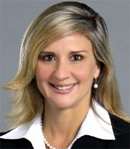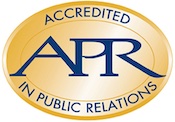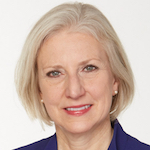 The shift of 2015 PRSA chair Kathy Barbour from Baptist Health South Florida to a marketing firm and the continued battle in the Hamptons over a Jewish religious boundary called an eruv involve religion, law, PR and the media.
The shift of 2015 PRSA chair Kathy Barbour from Baptist Health South Florida to a marketing firm and the continued battle in the Hamptons over a Jewish religious boundary called an eruv involve religion, law, PR and the media.
How these forces interact with each other, including which ones come out on top, is a topic that deserves exploration.
Since we’re getting no explanations from the PR side on Barbour’s shift, we’re making our own conjectures.
 Barbour Barbour |
Her previous employer for two and a half years was Baptist Health South Florida, a chain of six hospitals and other facilities that describes itself as the largest non-profit, healthcare organization in the region.
Baptist Health South Florida Is “Faith-Based”
BHSF also says it is “a faith-based organization guided by the spirit of Jesus Christ and the Judeo-Christian ethic.” It is committed to “utmost integrity and moral practice.” It also talks about its “spiritual foundation.”
So when Barbour became chair-elect of the PR Society last year, we contacted hospital officials and board members and said the Society’s boycott against the O’Dwyer Co., after selling its articles without permission from 1978 to 1994 and then conducting a campaign aimed at discrediting it, was inconsistent with the ethical values of BHSF as featured on its website.
The Society’s actions don’t square with its own ethical Code, either. The Code mentions “ethics” or “ethical” 13 times and says ethical behavior is the most important duty of a member.
Since efforts to remind the Society of its ethical promises go nowhere, the next move is to bring this to the attention of employers of the leaders of the Society.
Legal action is blocked because of the cost and years such a route requires. A current example is the dispute in Southampton, Westhampton Beach and Quogue over a proposed Orthodox religious boundary called an eruv.
Hamptons Eruv Fight in Fifth Year
That battle is now in its fifth year and shows every sign of continuing many years into the future.
BHSF officials and directors ignored our emails and letters but we notice that Barbour was no longer with the hospital as of the beginning of 2015. She joined Acosta in Jacksonville, a marketing firm that helps hundreds of companies including Procter & Gamble, Coca-Cola, Heinz, Nestle, Ocean Spray and ConAgra to have their products stocked in thousands of stores. Revenues are $1.2 billion.
She joined Acosta in Jacksonville, a marketing firm that helps hundreds of companies including Procter & Gamble, Coca-Cola, Heinz, Nestle, Ocean Spray and ConAgra to have their products stocked in thousands of stores. Revenues are $1.2 billion.
Barbour can now help Acosta tackle a negative image problem. Acosta appears to be in the business of dealing with supermarkets and other retail outlets that “auction off” their shelf space to the highest bidder.
That bidder may not be the one offering the best products at the best prices to consumers. A headline in the Washington Post tells it succinctly: ANALYSIS / Grocery stores demanding pay for shelf space / Profit motive may overshadow customers' preferences
The article, written Margaret Webb Pressler for the Washington Post of Jan. 20, 2004, referenced an 80-page 2003 study of the Federal Trade Commission that found that nationwide introduction of a new grocery product would cost $1.5 million to $2 million in slotting fees.
Motley Fool on Aug. 26, 2013 headlined “The Hidden Profit Machine for Grocery Stores,” saying such fees appear to be “the norm” for Kroger, Safeway and other chains. Allowing for inflation since 2003, the cost of a nationwide rollout would now be as high as $2.5M, it said.
Not charging such fees, it added, are Wal-Mart, Whole Foods, The Fresh Market and Fairway. Slotting fees are not only charged for new products but for keeping products on the shelves, said Sheefood.com, which wrote about the “harsh reality” of slotting fees and called them “unconscionable levies” that the consumer often does not know about.
Slotting fees are not only charged for new products but for keeping products on the shelves, said Sheefood.com, which wrote about the “harsh reality” of slotting fees and called them “unconscionable levies” that the consumer often does not know about.
Wikipedia said some companies feel such fees are “unethical.” All stories about slotting fees note that almost no one from the supplier or retail sides will talk about them. Such fees are said to be kept “off the books.” The practice is also common in bookstores, WP notes.
 Hill Hill |
Barbour switched to merchandising after 16 years in healthcare. Relevant is that president and CEO of Acosta is Robert E. Hill Jr., who since 2010 has been chair of Baptist Health of North Florida, another sizable chain with 9,000 employees.
Karen Brune Mathis, managing editor of the Financial News & Daily Record, Bailey Publishing & Communications, published an 2,580-word interview with Hill on July 23, 2012 that did not mention slotting fees.
BHNF Lacks Values Statement
Unlike BHSF, which has an elaborate, religion-based statement of values, BHNF has no such statement at all, saying it prefers to let its patients describe their experiences with the hospital.
Why wouldn’t Hill find a job for Barbour with BHNF since she has so much experience with hospitals and healthcare and none in the highly competitive world of fighting for and buying retail shelf space?
Melanie Husk, SVP, marketing and communications, BHNF, said in an email that Hill’s role as chair of BHNF has nothing to do with what organizations his employees choose to join or lead.
We beg to differ. He wouldn’t let Barbour lead the Klu Klux Klan or any other organization with dubious behavior. The PR Society’s boycotting of the O’Dwyer Co. is a violation of press freedom, a bedrock value of America. The Society is supposed to be setting an example of good, not bad, press relations. The National Press Club in 2011 urged the Society to drop its boycott in a release sent to 395 major media. NPC was ignored.
Abusive Society policies and practices, documented in this “directory” of them, are the reason it has hardly grown since 2000. It membership was 19,600 then vs. 22,000 currently which is minimal growth since PR jobs reached 208,030 as of May 2014, according to the U.S. Dept. of Labor.
Reporting and correspondent jobs totaled 29,100 as of 2012, according to the Dept.
Husk was a principal in Husk Jennings Galloway & Partners, which was sold in 2005 to Tom Bolling and Frank Constantini. Also a principal was Del Galloway, chair of the Society in 2004 and now VP-communications, Wells Fargo, Mid-Atlantic. He is co-chair of the 2015 Society conference in Atlanta Nov. 8-10 with Lori George Billingsley, VP-community relations of Coca-Cola, and Mark Dvorak, EVP, Golin/Atlanta.
Perhaps one of the three or all three will support the right of the O’Dwyer Co. to exhibit at the conference.
Hamptons Battle Involves Religion, Law, PR, Press
A spotlight was turned on the eruv battle in WHB March 27 when comedian Lewis Black urged proponents of the eruv to stop their campaign to put “little things” (called “lechis”) on local utility poles.
“You are allowed to establish your imaginary walls, you can have your imaginary walls,” he said. “There is no need for you to tell the village you have to put up little things to have your imaginary walls. Why? Because they’re imaginary.”
However, an eruv cannot be totally imaginary. The acceptance of Orthodox physical objects on telephone poles, even if they are “barely visible” as claimed in court documents, signifies that the community accepts the eruv and validates it.
This acceptance of “god’s will” by the community is a must for a legitimate eruv.
Although the multi-million dollar Hamptons’ eruv battle is a major story with many angles and developments, press coverage has been sparse. The New York Times has had a blackout on the story for more than two years and Newsday, owned by Cablevision, only prints an occasional item. The Southampton Press/27east.com and O’Dwyer’s have provided the main coverage. A local news service called “Patch” also has a blackout on the subject although it carried two long stories several years ago.


 PRSA-NY today announced its five honorary co-chairs for its Big Apple Awards ceremony gala slated for TAO Downtown on Nov. 15.
PRSA-NY today announced its five honorary co-chairs for its Big Apple Awards ceremony gala slated for TAO Downtown on Nov. 15. PRSA-NY president Carmella Glover today issued a "heartfelt apology" on behalf of the chapter for her Oct. 14 message that "caused disappointment and hurt to some of our valued members."
PRSA-NY president Carmella Glover today issued a "heartfelt apology" on behalf of the chapter for her Oct. 14 message that "caused disappointment and hurt to some of our valued members." The leadership of Public Relations Society of America is backing a move to change the current “must-have” APR accreditation to “strongly preferred” as a requirement for a seat on its board of directors.
The leadership of Public Relations Society of America is backing a move to change the current “must-have” APR accreditation to “strongly preferred” as a requirement for a seat on its board of directors. Public Relations Society of American today named Linda Thomas Brooks CEO, succeeding CFO Phil Bonaventura, interim chief since July 2019.
Public Relations Society of American today named Linda Thomas Brooks CEO, succeeding CFO Phil Bonaventura, interim chief since July 2019.


 Have a comment? Send it to
Have a comment? Send it to 
No comments have been submitted for this story yet.